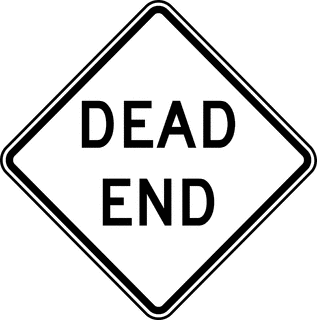
As mentioned in a couple previous posts, I'm wrapping up my Novel-In-Progress. This has been a long, somewhat traumatic process, but it's getting done. About two weeks ago, I realized that I had to scrap the ending entirely. Why? Because my ending wasn't The Ending.
Confused? Let me clarify.
To be a good ending to a novel: 1) there has to some resolution to the major problems faced by the central character/s (this doesn't mean there is a happy ending, just that you see things are settled); 2) the conclusion should share the themes addressed at the beginning of the book (even if it's to turn the initial beliefs of the characters on their heads); 3) the end should be consistent with the details and personality brought up earlier in the novel; and 4) the reader should feel satisfied that they didn't waste their time.
While some books have many possible "Endings" that flow logically from what precedes, there are also many "endings"--dead ends that leave the reader disappointed. You can't expect a reader to be satisfied by the last minute introduction of a character (never before seen in your novel) to save everyone from destruction. Unless you're trying to be funny, it probably won't work for a character to act like their personality has been switched with the hero of a different story entirely. Consistency helps your world become believable to the reader.
The ending I wrote in my outline was replaced long ago with another. However well this ending resolved the characters' dilemmas, it didn't really address the same themes as the initial chapters of the book, nor did it satisfy the readers. Everyone who read my first complete draft seemed to sense that I was holding back certain details of how the book should finish. The truth was, I was afraid to write the Ending the way it should be written, because I was afraid it would become unpublishable.
What do I mean by "unpublishable?" All publishing houses use a style guide. Normally, this governs mechanics like punctuation, capitalization, use of American English vs. British English, and the like. However, Orthodox Jewish publishing houses have an additional level of what words, topics, and the like that they think are appropriate to include in their books. Truly, other kinds of publishers have similar guidelines, just must less stringent ones. Then magnificent Ending I have just written has just crossed a few too many of those guidelines most likely to be found at an Orthodox press. However, the book is VERY, VERY Jewish. Like probably wouldn't make sense if you didn't have a sound foundation in Yiddishkeit.
I think I have now written the Ending the way it should be, but it's just as unpublishable as I feared. Seeking sympathy and advice, I spoke to the ladies from my writing group. They think I should keep the new conclusion, since it is after all the Ending.
And so now, I will have to revise yet again, to see if I can make this book into something someone (other than myself) would publish.
Picture courtesy of http://etc.usf.edu/clipart/68000/68050/68050_123_W14-1_b.htm
No comments:
Post a Comment